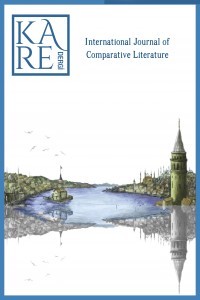“SURPRISED AND DAZZLED WITH THE BEAUTY OF THE SULTAN’S CAPITAL”: DEPOLITICIZATION AND DEHISTORICIZATION OF CULTURE IN DEMETRA VAKA-BROWN’S HAREMLIK: SOME PAGES FROM THE LIFE OF TURKISH WOMEN
In this paper, Demetra Vaka-Brown’s representation of “Turkish women” in her personal narrative, Haremlik (1909), after her re-encounter with them at the beginning of the twentieth century will be explored. It will be argued that the writer’s hold on her (cultural) identity as a GreekOttoman woman does not serve a “political” function despite her claim to the contrary; through Haremlik, Vaka-Brown attempts to write her own (personal) (hi)story rather than a collective story of “Turkish women” at the beginning of the twentieth century. The analysis of her narrative will mainly draw on Edward Said’s Orientalism and Arif Dirlik’s critique of depoliticization as well as dehistoricization of culture in his article, “Literature/Identity: Transnationalism, Narrative and Representation.”
Anahtar Kelimeler:
Vaka-Brown, Haremlik, Orientalism, Kültürel Kimlik, Kültürün Politiksizleştirilmesi, Kültürün Tarihsizleştirilmesi
İSTANBUL’UN GÖZ ALICI GÜZELLİĞİ”: DEMETRA VAKA-BROWN’UN HAREMLİK: TÜRK KADINLARININ HAYATINDAN KESİTLER ADLI ANLATISINDA KÜLTÜRÜN TARİHİ VE SİYASİ BAĞLAMDAN KOPARILMASI
In this paper, Demetra Vaka-Brown’s representation of “Turkish women” in her personal narrative, Haremlik (1909), after her re-encounter with them at the beginning of the twentieth century will be explored. It will be argued that the writer’s hold on her (cultural) identity as a GreekOttoman woman does not serve a “political” function despite her claim to the contrary; through Haremlik, Vaka-Brown attempts to write her own (personal) (hi)story rather than a collective story of “Turkish women” at the beginning of the twentieth century. The analysis of her narrative will mainly draw on Edward Said’s Orientalism and Arif Dirlik’s critique of depoliticization as well as dehistoricization of culture in his article, “Literature/Identity: Transnationalism, Narrative and Representation.”
Keywords:
Vaka-Brown, Haremlik, Orientalism, Cultural Identity, Depoliticization of Culture, Dehistoricization of Culture,
- ISSN: 2536-4596
- Yayın Aralığı: Yılda 2 Sayı
- Başlangıç: 2016
- Yayıncı: Hasan BAKTIR
